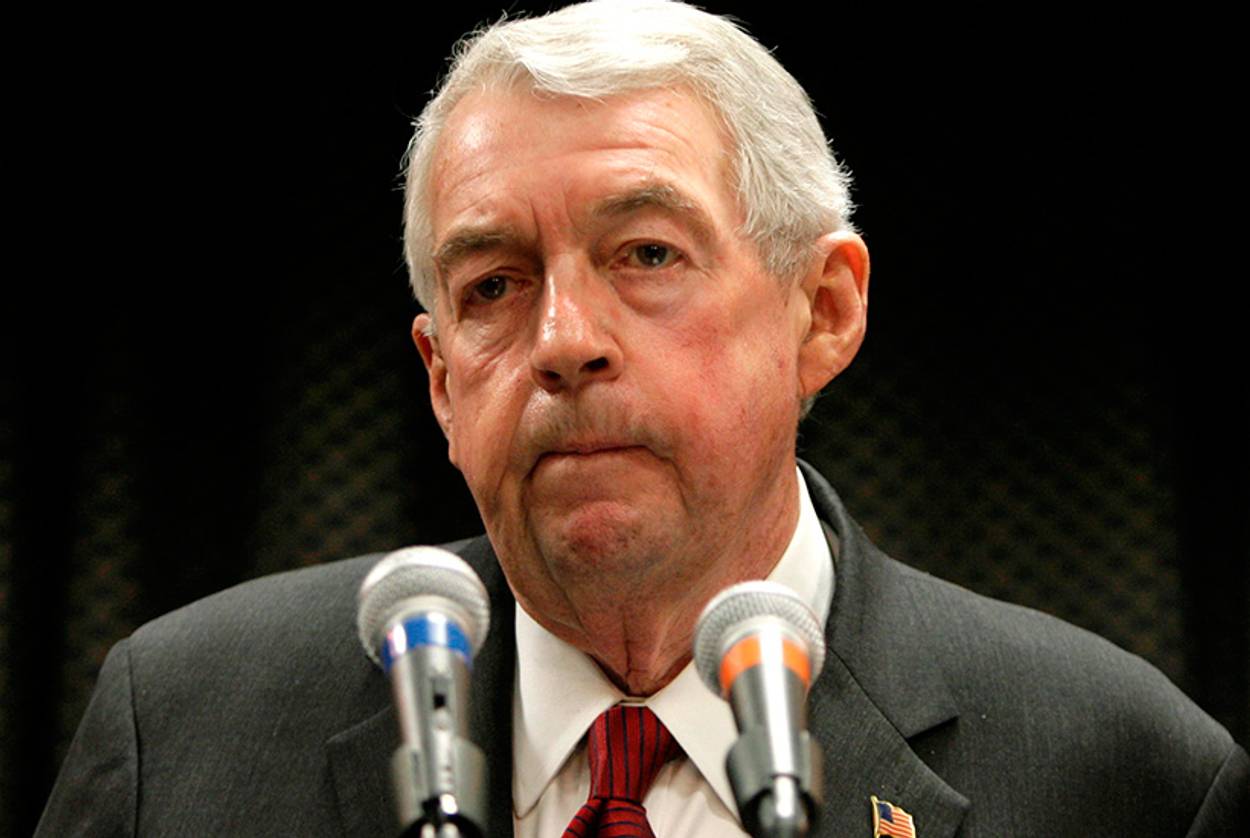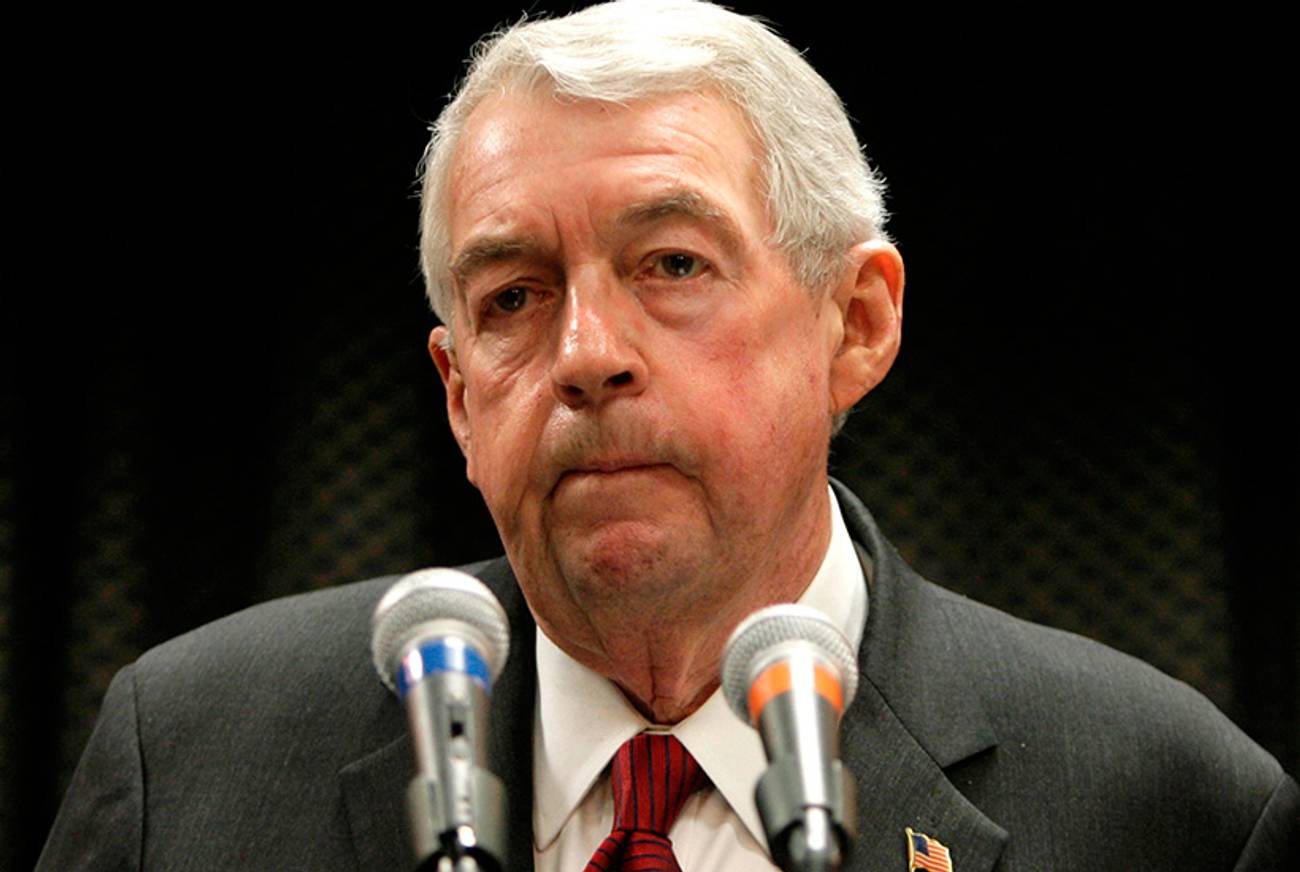In Brooklyn, a Prosecutor Finds Losing Ultra-Orthodox Support Might Cost His Job
Joe Hynes faces an unprecedented electoral defeat after longtime Jewish supporters leave his side




Shouts of “Let’s Go, Joe!” rang out on the steps of Brooklyn’s Borough Hall as District Attorney Charles Hynes—known as Joe—announced the relaunch of his re-election campaign on Oct. 8. The Kings County D.A., running as a Democrat, had lost the primary vote to challenger Ken Thompson, a former federal prosecutor, on Sept. 10. It was the first time in half a century that an incumbent D.A. had lost in New York, and by no mean margin, either: Thompson picked up a cool 55 percent of the vote, while Hynes only got 44 percent. So, with no Republican on the ticket, Hynes promptly raised $150,000 and is now running on the GOP line for a seventh term.
In a beautiful three-piece suit, reading a prepared speech, Hynes said he originally thought “such a run was unrealistic.” But, he noted, only 18 percent of registered Democrats had shown up to vote in the primaries, and so the results could hardly be said to represent the will of the people. How unfair, Hynes argued, that those Democrats who didn’t turn up for the primary should be blocked from choosing their district attorney on Nov. 4! Hynes spoke not like a politician but like a professor, relying on the relationship between his premises and his conclusions rather than on rhetoric, tone, or gesticulation.
At 78, Hynes was the picture of the gentleman politician from an earlier, pre-Anthony Weiner era. No one would have thought twice if he had announced his intention to retire after his primary defeat, after a long, full career. But his decision to fight on is only the latest Hynes spectacle this year, after a much-derided CBS reality show.
The question is, can Hynes win? “It’s a race that people will be watching very closely to see if this is something that is possible in Brooklyn,” says Erik Engquist, the assistant managing editor at Crain’s New York Business, who has covered Brooklyn politics for 22 years. “The fact that it hasn’t been done successfully before doesn’t mean it can’t be done. Hynes has had the Republican line before; he just didn’t need it.”
That was due in no small part to a special relationship Hynes shared with one of Brooklyn’s crucial demographics: the Orthodox Jewish community. But in recent years, that relationship has cooled, in part because of Hynes’ approach to the pursuit of sex abuse in ultra-Orthodox communities. Now a man whose career was made by his alliance with Brooklyn’s ultra-Orthodox leaders is desperately trying to make sure they don’t end it by abandoning him.
***
Hynes was born and raised in Brooklyn’s Flatbush neighborhood. A graduate of St. John’s, he began his career as a legal aid attorney and went to work for the Brooklyn D.A.’s office—the third-largest in the country—in 1969. As a young prosecutor, Hynes ran the racket squad, investigating the Mafia. In 1987, as a special state prosecutor overseeing New York City’s criminal justice system, Hynes took on the politically charged investigation into an attack in Howard Beach, Queens, in which a young black man was killed after being chased onto a highway by three white teenagers. Hynes won manslaughter convictions against all three teens.
In 1989, Hynes ran for district attorney and won a glowing endorsement from the New York Times. “Joe Hynes offers a reassuring public presence and a solid record. He is an unusually clear and appealing choice,” the Times wrote, lauding his “credibility on racial issues.” Throughout the campaign, the Times celebrated Hynes’ record on other noteworthy programs: He advocated for drug treatment instead of prison sentences. He made a big splash prosecuting nursing-home fraud. He prosecuted narcotics squad officers for offering informants drugs in exchange for information.
“Hynes, for a long time, was at the forefront of taking on sacred political cows,” said Michael Fragin, a former Jewish community liaison for Gov. George Pataki who now hosts a weekly radio show on New York politics and is also acting as a Jewish community liaison to Joe Lhota’s mayoral campaign.
Early into Hynes’ tenure, he began to cultivate close ties with the Orthodox Jewish establishment. In 1991, when the Crown Heights riots erupted in the middle of Hynes’ jurisdiction, he was accused of giving preferential treatment to Jews because he charged a black teenager in the stabbing death of a Jewish man in the violence but never charged the Hasidic driver responsible for striking and killing the 7-year-old black child whose death triggered the unrest.
Those criticisms were revived four years ago when, on the heels of accusations that he wasn’t being aggressive enough about prosecuting sex crimes in the Orthodox community—and specifically, of allowing religious authorities to handle abuse cases—Hynes launched a new program, Kol Tzedek (the Voice of Justice), for investigating sexual abuse in the Orthodox community. The program, which featured a special hotline, was meant to answer a longstanding problem with victims of sexual abuse in ultra-Orthodox communities being dissuaded from going to secular authorities. But as part of the program, Hynes promised not to publicize the names of sexual offenders, including those who were convicted, in the Orthodox community. While Hynes credits the program with generating dozens of new prosecutions against Orthodox sexual offenders after its launch in 2009, Kol Tzedek looked to many like a special system of justice designed to accommodate the sensitivities of the ultra-Orthodox community. “Playing favorites did not go over well in the minority community,” Engquist said. “Treating the Orthodox differently, having two sets of rules, is the worst thing a prosecutor can be accused of.”
But others defended the program, saying that the problem of sexual abuse lies in the community, not in the D.A.’s attempt to pursue justice therein. “It’s unfair to call it preferential treatment,” said Lew Fidler, a Democratic city councilman who was campaign manager for Hynes’ first run in 1989. “He gets beaten up for being preferential, then beaten up for being too harsh. Hynes did everything he could in his best judgment to bring criminals to justice, particularly sexual ones.”
It was in his defense of Kol Tzedek that Hynes managed to alienate the Orthodox community. “I haven’t seen this kind of intimidation in organized crime cases or police corruption,” Hynes said in one interview, explaining why Kol Tzedek was necessary. Hynes claimed that as soon as a defendant’s name came up, community leaders “would engage this community in a relentless search for the victims,” Hynes said in another. “And they’re very, very good at identifying the victims. And then the victims would be intimidated and threatened, and the case would fall apart.”
Last year, Hynes made comments during and after the trial of Nechemya Weberman, an unlicensed counselor and spiritual mentor who was convicted of 59 counts of sexual abuse and sentenced to 103 years in prison, that particularly rankled members of the community. The week of Weberman’s sentencing, Hynes wrote an op-ed in the Daily News comparing the intimidation of abuse victims in Orthodox communities to “the Mafia, but at least in Mafia cases we can offer victims witness protection. That does not work in these insular communities, where it is more difficult to leave behind friends and family and go into hiding.” The language Hynes chose reinforced the idea that he was, in a sense, putting the community on trial. “Hynes used the Hasidic way of life to secure a conviction,” said one community member who now supports Thompson. “He started going crazy on the community. He goes out there and uses radioactive terms. He really pissed off a lot of people. It’s the way you prosecute that is the sticking point.”
***
Thompson, 48, is best known for representing the Hotel Sofitel maid who accused Dominique Strauss-Kahn, the French politician and former IMF chief, of sexually assaulting her at the hotel. His campaign has been predicated on a vision of “fairness and equality for all.” When we spoke last week, Thompson cited as an example of a lack of fairness the revelation that Hynes’ office had wrongfully convicted a man of murder, prompting the review of 50 cases.
In the primary, Thompson attracted the backing of Jerrold Nadler, a Democratic congressman who represents a swath of Brooklyn that includes both Borough Park and newly gentrified Red Hook—which may have helped Thompson secure support in secular Jewish precincts. “The Democrats in the borough have changed in many ways,” said Fidler. “A good portion of the African Americans are not aware of the heroic things Joe did before he became D.A., and they aren’t aware of the progressive measures he took as a prosecutor.”
Hynes did himself no favors by agreeing to appear in a CBS reality show about his office, Brooklyn D.A. Aside from drawing objections from the Thompson campaign, which argued that it amounted to free campaign advertising, the show brought further attention to the wrongful convictions in his office. (The Hynes campaign did not respond to requests for comment for this story.)
Thompson also won the support of Dov Hikind, the state assemblyman and Orthodox kingmaker, who very publicly endorsed Hynes’ challenger, leading him around Borough Park and encouraging people to vote for him. (Hikind did not respond to requests for comment.) Hikind’s district nevertheless went to Hynes by about four to one, but voting was down citywide, including in Brooklyn, according to the veteran political consultant Jerry Skurnick.
Yet, since his primary loss, Hynes has lost the support of even his closest Orthodox allies. Fidler, his longtime friend, switched his endorsement to Thompson, his fellow Democrat, after Hynes initially indicated he wouldn’t make a run as a Republican. “I honor my commitments,” Fidler said.
Similarly, both Satmar sects have endorsed Thompson, though Hynes attracted the support of the Ahrony sect of the Satmar community during the primary. Hynes continues to shed leaders of the Orthodox community. Next Monday, Leon Goldenberg and Abe Biderman—leaders of the Agudath Israel—will host a breakfast for Thompson.
Nevertheless, Hynes continues to make personal appeals to his former allies. Recently, the D.A. was quoted as saying in response to the Satmar endorsement of Thompson, “There’s no religious mandate that would prevent you from rethinking your endorsement.”
Editor’s note: This story has been updated to reflect that the breakfast leaders of the Agudath Israel are hosting for Thompson will take place on Monday, Oct. 28. It has not already been held.
***
Like this article? Sign up for our Daily Digest to get Tablet Magazine’s new content in your inbox each morning.
Batya Ungar-Sargon is a freelance writer who lives in New York. Her Twitter feed is @bungarsargon.
Batya Ungar-Sargon is a freelance writer who lives in New York. Her Twitter feed is @bungarsargon.